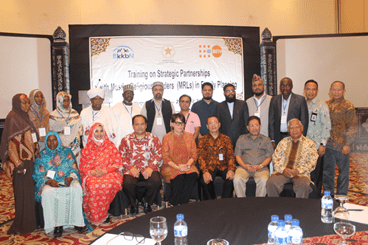Indonesia has been referred to as having an excellent family planning programme that paved the way for economic growth. Started in 1970s, it contributed to favorable changes in demographic indicators; notably the dramatic decline of the total fertility rate (TFR) with the increase in the contraceptive prevalence rate (CPR). Part of this success has been attributed to Muslim Religious Leaders (MRLs)’s role in promoting family planning programme and raising public awareness in their respective communities that family planning is in line with Islamic teaching.
In order to share Indonesia’s experience of involving religious leaders in family planning, UNFPA, the National Population and Family Planning Board (BKKBN) and The Ministry of State Secretariat of the Republic of Indonesia organized a training course entitled “Developing Strategic Partnerships with Muslim Leaders in Family Planning" in Yogyakarta from 24-29 April 2017. This course is part of the South-South and Triangular Cooperation).
In total, there were 14 participants from 6 different countries including Nepal, Niger, Nigeria, Chad, Sudan and Pakistan. The participants were selected among 48 candidates from 10 countries. The participants were mainly eminent Muslim Religious Leaders (MRLs) and development sector specialists working to spread the messages of family planning in their respective countries.
The main objective of the training was to share Indonesia’s best practices on family planning activities and programs. The mainstay of the course was to introducetraining concepts on how to engage Muslim Leaders in family planning programmes. The course commenced with a series of presentations covering topics such as Islamic Perspectives on Family Planning Programmes, Islamic Perspectives of Adolescent Reproductive Health and the Role of Nahdlatul Ulama and Muhammadiyah in Family Planning. Nahdlatul Ulama and Muhammadiyah are the Indonesia’s biggest Islamic organizations and played a pivotal role in achieving the targets envisioned by the national family planning programme.
The participants learned from the visual presentations and were invited to assess and evaluate critically the presentations. The participants participated keenly in all the sessions and asked questions on issues pertaining to their national cultural, ethos and norms. This questions and answers sessions unveiled a diversified array of family planning activities and how Muslim Religious Leaders (MRLs) were actively involved to promote family planning messages and programs for the health and well-being of families.
For the training, field visits were also conducted where the participants learned directly from field observations about implementation of FP programmes and community-based activities undertaken by local Muslim leaders, who have been actively involved in family planning. Among the activities observed included pre-marriage counselling at the District Religious Affairs office (KUA), an Adolescent Reproductive Health programme at an Islamic boarding school, the mosque-based Beyond Family Planning programme, and family planning services at an Islamic hospital.
Through the field visits, participants observed activities that were practicable and they engaged in dialogue with grass-root communities and local religious and community leaders, in particular Muslim Religious Leaders (MRLs). Later, the participants were given an opportunity to apply the knowledge and skills they had learned from the course by developing Action Plans for their respective countries to better engage MRLs to enhance the effectiveness of family planning programme and activities.
One of participants from Pakistan named Mansoor Qaisar expressed his opinion about the course saying, “We would like to express our deepest appreciation for the opportunity to learn from the Indonesian experience on family planning program with active role of local MRL’s and lauded the ministries and institutions who have been thoroughly involved in it. The involvement of Ulamas, the transformation of Islamic schools and the involvement of youth in family planning activities – these all, without a shadow of doubt, have contributed to the success of family planning activities in Indonesia. Muslim countries must learn from such prolific examples of Indonesia and I believe, the Indonesian experience of introducing the concept of permissibility of birth spacing in Islam has been an exceptional success. This programme has not only benefited and saved the lives of millions of mothers but also being an important factor for promoting the health and wellbeing of their families.”


